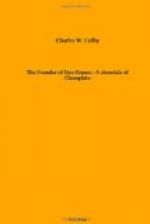Bound up with habitual fortitude is the motive from which it springs. In Champlain’s case patriotism and piety were the groundwork of a conspicuous and long-tested courage. The patriotism which exacted such sacrifices was not one which sought to define itself even in the form of a justifiable digression from the recital of events. But we may be sure that Champlain at the time he left Port Royal had made up his mind that the Spaniards, the English, and the Dutch were not to parcel out the seaboard of North America to the exclusion of the French. As for the religious basis of his fortitude, we do not need Le Jeune’s story of his death-bed or the record of his friendship with men of religion. His narrative abounds throughout with simple and natural expressions of piety, not the less impressive because they are free from trace of the theological intolerance which envenomed French life in his age. And not only did Champlain’s trust in the Lord fortify his soul against fear, but religion imposed upon him a degree of self-restraint which was not common among explorers of the seventeenth century. It is far from fanciful to see in this one of the chief causes of his hold upon the Indians. To them he was more than a useful ally in war time. They respected his sense of honour, and long after his death remembered the temperance which marked his conduct when he lived in their villages.
As a writer, Champlain enjoyed the advantage of possessing a fresh, unhackneyed subject. The only exception to this statement is furnished by his early book on the West Indies and Mexico, where he was going over ground already trodden by the Spaniards. His other writings relate to a sphere of exploration and settlement which he made his own, and of which he well merited to be the chronicler.
Running through the Voyages is the double interest of discovery and colonization, constantly blending and reacting upon each other, but still remaining matters of separate concern. It is obvious that in the mind of the narrator discovery is always the more engaging theme. Champlain is indeed the historian of St Croix, Port Royal, and Quebec, but only incidentally or from chance. By temper he was the explorer, that is, the man of action, willing to record the broad results, but without the instinct which led Lescarbot to set down the minutiae of life in a small, rough settlement. There is one side of Champlain’s activity as a colonizer which we must lament that he has not described—namely, his efforts to interest the nobles and prelates of the French court in the upbuilding of Canada. A diary of his life at Paris and Fontainebleau would be among the choicest documents of the early colonial era. But Champlain was too blunt and loyal to set down the story of his relations with the great, and for this portion of his life we must rely upon letters, reports, and memoranda, which are so formal as to lack the atmosphere of that painful but valiant experience.




